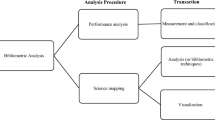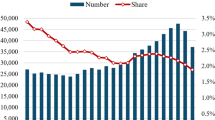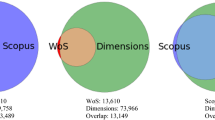Abstract
After the fall of the USSR in 1990, there was a steady stagnation of Russian science for 15 years. The restoration started in 2006 after the government introduced new science policies with funds depending on the research assessment. As it follows from this paper, the trends of publication activity in Russia have changed after that. On the other hand, the number of annual scientometric publications in Russia increased sharply from dozens to hundreds in the period of 2006–2014. In this paper, we consider whether these facts are related or not. We investigated the dynamics and structure of scientometric articles flow and revealed how it is related to the stages of Russian Science reformation. In the final part, we made a brief review of the most cited issues including country research specialization, low citing, and Matthew index. The aim of this paper is to make a review of new Russian scientometrics landscape and to explain the reasons why it has changed.







Similar content being viewed by others
Notes
Russian Science Citation Index (RSCI) is a bibliographic database of scientific publications in Russian. It accumulates more than 20 million publications of Russian authors, as well as information about citing these publications from more than 5000 Russian journals (only 154 of them presented in Web of Science in 2014).
References
Bornmann, L., & Leydesdorff, L. (2014). Scientometrics in a changing research landscape. EMBO Reports, 15(12), 1228–1232.
Bouabid, H. (2014). Science and technology metrics for research policy evaluation: Some insights from a Moroccan experience. Scientometrics, 101(1), 899–915. doi:10.1007/s11192-014-1407-3.
Dutt, B., Garg, K., & Bali, A. (2003). Scientometrics of international journal Scientometrics. Scientometrics, 56(1), 81–93. doi:10.1023/A:1021950607895.
Edition Board. (2001). About the Nalimov memorial issue of the journal Scientometrics. Scientometrics, 52(2), 107–109. doi:10.1023/A:1017986917073.
Garg, K. (2003). An overview of cross-national, national, and institutional assessment as reflected in the international journal Scientometrics. Scientometrics, 56(2), 169–199. doi:10.1023/A:1021963010621.
Gohberg, L., & Sagieva, G. (2007). Russian science: Bibliometric indicators. Foresight, 1, 44–53. (in Russian).
Guskov, A. (2015a). Rossijskaja naukometrija: obzor issledovanij [Russian scientometrics: Review of researches]. Bibliosfera, 3, 75–86. (in Russian).
Guskov, A. (2015b). Reforma rossijskoj nauki kak impul’s dlja razvitija naukometricheskih issledovanij: (vstupitel’naja stat’ja) [Reformation of Russian science as an impulse for the development of scientometric studies (introductory article)]. Procedings of SPSTL SB RAS, 9, 5–13. (in Russian).
Guskov, A., Zhizhimov, O., Kikhtenko, V., Skachkov, D. & Kosyakov, D. (2013) RuCRIS: A pilot CERIF based system to aggregate heterogeneous data of Russian research projects. Procedia Computer Science, 33, 163-167. ISSN:1877-0509, doi:10.1016/j.procs.2014.06.027
Haitun, S. (1980). Scientometric investigations in the USSR. Scientometrics, 2(1), 65–84. doi:10.1007/BF02016600.
Hood, W., & Wilson, C. (2001). The literature of bibliometrics, scientometrics, and informetrics. Scientometrics, 52(2), 291–314. doi:10.1023/A:1017919924342.
Hou, H., Kretschmer, H., & Liu, Z. (2008). The structure of scientific collaboration networks in Scientometrics. Scientometrics, 75(2), 189–202. doi:10.1007/s11192-007-1771-3.
Kabir, S. (1995). Bibliometrics of Bibliometrics. SRELS Journal of Information Management, 32(1), 13–24. doi:10.17821/srels/1995/v32i1/48666.
Knyazeva, S., & Slascheva, N. (2008). Scientific and technical cooperation between Russia and EC. Foresight., 5(1), 30–41. (in Russian).
Kocemir, M. (2012). Publikacionnaya aktivnost rossiyskikh uchenyikh v vedushikh mirovyikh zhurnalakh. Acta naturae, 2(2), 15–35.
Kozak, M., Bornmann, L., & Leydesdorff, L. (2015). How have the Eastern European countries of the former Warsaw Pact developed since 1990? A bibliometric study. Scientometrics, 102(2), 1101–1117. doi:10.1007/s11192-014-1439-8.
Markusova, V., Ivanov, V., & Varshavskii, A. (2009). Bibliometric indicators of Russian Science and of the Russian Academy of Sciences (1997–2007). Herald of the Russian Academy of Sciences, 79(3), 197–204. doi:10.1134/S1019331609030010.
Marshakova, I. (1973). System of document connections based on references. Scientific and Technical Information Serial of VINITI, 6, 3–8.
Marshakova-Shaikevich, I. (2007). Tematicheskij spektr issledovatelskoj aktivnosti Rossii [The thematic range of research activity in Russia]. Herald of the Russian Academy of Sciences, 77(9), 811–818. [in Russian].
Marx, W., & Bornmann, L. (2015). On the causes of subject-specific citation rates in Web of Science. Scientometrics., 102(2), 1823–1827. doi:10.1007/s11192-014-1499-9.
Mazov, N., & Gureev, V. (2014). The role of unique identifiers in bibliographic information systems. Scientific and Technical Information Processing, 41(3), 206–210.
Merkulov, I. (2012). Competitiveness of Russian medical science: The state, problems and prospects. Clinical Practice., 3, 4–13. [in Russian].
Mokhnacheva, Yu., & Kharybina, T. (2011). Research performance of RAS institutions and Russian universities: A comparative bibliometric analysis. Herald of the Russian Academy of Sciences, 81(6), 569–574. doi:10.1134/S1019331611060104.
Nalimov, V., & Mulchenko, Z. (1969), Naukometriya. Izuchenie Razvitiya Nauki kak Informatsionnogo Protsessa. [Scientometrics. Study of the Development of Science as an Information Process], Nauka, Moscow, (English translation: 1971. Washington, D.C.: Foreign Technology Division. U.S. Air Force Systems Command, Wright-Patterson AFB, Ohio. (NTIS Report No.AD735-634).
Ocubo, Y. (2000). An introduction to scientometrics research in France. Scientometrics, 47(3), 451–455. doi:10.1023/A:1005663732094.
Penkova, O., & Tyutyunnik, V. (2001). Informetrics, scientometrics and bibliometrics: The scientometrics analysis of current state. Vestnik Tomskogo gosudarstvennogo universiteta., 6(1), 86–87. [in Russian].
Pislyakov, V. (2007). Why create national citation indexes? Scientific and Technical Libraries, 2, 65–71. [in Russian].
Pislyakov, V., & Dyachenko, E. (2009). Citation expectations: Are they realized? Study of the Matthew index for Russian papers published abroad. Scientometrics, 83(3), 739–749.
Pouris, A. (1994). Is scientometrics in a crisis? Scientometrics, 30(2–3), 397–399. doi:10.1007/BF02018111.
Pouris, A. (2012). Scientometric research in South Africa and successful policy instruments. Scientometrics, 91(2), 317–325. doi:10.1007/BF02018111.
Small, H. (1973). Co-citation in the scientific literature: A new measure of the relationship between two documents. Journal of the American Society for Information Science, 24(4), 265–269. doi:10.1002/asi.4630240406.
Acknowledgments
The authors gratefully acknowledges Mikhail Tsentalovich and Dmitri Tsentalovich for their help with text revision. The main idea of the article and draft data were previously discussed by the authors in Russian language (Guskov 2015b).
Author information
Authors and Affiliations
Corresponding author
Rights and permissions
About this article
Cite this article
Guskov, A., Kosyakov, D. & Selivanova, I. Scientometric research in Russia: impact of science policy changes. Scientometrics 107, 287–303 (2016). https://doi.org/10.1007/s11192-016-1876-7
Received:
Published:
Issue Date:
DOI: https://doi.org/10.1007/s11192-016-1876-7




